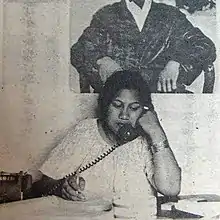Miriama Rauhihi-Ness
Miriama Rauhihi-Ness (née Rauhihi; 15 July 1951 – 15 March 2021), also known as Ama Ness, was a New Zealand Māori activist and social worker.[1] She was one of the organisers of the 1975 Māori land march. In 1972, she helped lodge a Māori language petition, eventually culminating in Māori becoming an official language of New Zealand in 1987. She brought the Pacific community of New Zealand together, fighting for the rights of Māori and Pasifika alike.[2][3][4][5]
Miriama Rauhihi-Ness | |
|---|---|
 Rauhihi-Ness in 1977 | |
| Born | 15 July 1951 New Zealand |
| Died | 15 March 2021 (aged 69) |
| Occupation | Social worker |
| Known for | Māori activism |
| Spouse | |
| Relatives | Che Fu (son) |
Early life
Rauhihi was born on 15 July 1951, and was raised in Shannon.[2][6] Of Māori descent, she affiliated to Ngāti Raukawa ki te Tonga.[7] At age 18, she moved to Ponsonby in Auckland, where she worked in a sewing factory and observed unfair working conditions. Rauhihi was elected union representative, and within six months had organised a strike over unfair working conditions for Pasifika workers.[2][7]
Polynesian Panthers
Rauhihi joined the Polynesian Panthers in 1971.[8] In 1972, she held the portfolio for culture in the male-dominated Panthers, which had chauvinistic members; as a result she began organising gender equality workshops for the Panthers and men in the community to target cultural bias and violence against women.[8][9]
In the wake of the strike organised in Ponsonby, she was asked to join the Polynesian Panthers as their first full-time community worker in 1973.[7][8] Her work in the Panthers primarily involved running the Panther's headquarters, and filtering calls of those needing help, but she also participated in frontline work.[3]
Rauhihi-Ness's participation in the 1975 Māori land march, led by Whina Cooper, is considered pivotal, as she was responsible for organising the logistics of the march and for involving the Panthers.[4][10] Notably, the march rested at her marae, Poutou Marae in Shannon.[7]
In the aftermath of the 1976 police shooting of Daniel Houpapa, Rauhihi-Ness rallied the Panthers to march to Taumarunui in protest. She also strongly supported the Bastion Point occupation of 1977–1978.[7] During the 1981 Springbok Tour she worked as a marshal, organising opposition to the tour.[10] Although the Panthers disbanded after the Springbok Tour, Rauhihi-Ness continued her community work until her death.[7]
Other work
Rauhihi-Ness was part of the 1973 Māori delegation to China alongside names such as Hone Tuwhare, and Tame Iti, which studied Chinese minority groups.[1][8] She also joined Ngā Tamatoa, a Māori version of the Polynesian Panthers, and contributed towards making the Māori language an official language of New Zealand through her involvement in a petition that amassed over 30,000 signatures.[8]
Personal life
Rauhihi married musician Tigilau Ness, whom she had met during her time with the Polynesian Panthers,[7] and gave birth to musician Che Fu.[5] The couple later separated. Rauhihi-Ness died on 15 March 2021 from cancer at the age of 69, having been diagnosed only weeks earlier.[2][4] She was buried at Waikumete Cemetery, Auckland.[6]
References
- "Rauhihi-Ness, Miriama, active 1971–2019". National Library of New Zealand. Archived from the original on 1 October 2023. Retrieved 2 April 2021.
- Jackson, Willie (17 March 2021). "Poroporoaki: Miriama Rauhihi Ness". New Zealand Government. Archived from the original on 29 June 2023. Retrieved 30 September 2023.
- "Legacy of Miriama Rauhihi Ness remembered". Te Ao Māori News. Māori Television. 16 March 2021. Archived from the original on 17 March 2021. Retrieved 2 April 2021.
- Tyson, Jessica (19 March 2021). "Polynesian Panthers honour Miriama Rauhihi Ness for dedicating her life to fight for Māori rights". Stuff. Archived from the original on 20 March 2021. Retrieved 2 April 2021.
- "Miriama Rauhihi Ness a fighter for Maori and Pasifika". Waatea News. 15 March 2021. Archived from the original on 16 January 2023. Retrieved 30 September 2023.
- "Record for Miriama Rauhihi-Ness". Auckland Council. Archived from the original on 1 October 2023. Retrieved 30 September 2023.
- Carnachan, Eugene. "Warrior wahine will be remembered for resolute stance on worker rights". Newsroom. Archived from the original on 18 March 2021. Retrieved 30 September 2023.
- Anae, Melani (14 June 2021). "On the Dawn Raids and apologies – a Polynesian Panther writes". The Spinoff. Archived from the original on 26 January 2023. Retrieved 30 September 2023.
- Shilliam, Robbie, "The Polynesian Panthers and the Black Power Gang: Surviving Racism and Colonialism in Aotearoa New Zealand*", Black Power beyond Borders, Palgrave Macmillan, doi:10.1057/9781137295064.0010, ISBN 978-1-137-29506-4, retrieved 27 November 2020
- Triponel, Te Rina (18 March 2021). "Māori and Pasifika mourn loss of former Ngā Tamatoa activist and Polynesian Panther Miriama Rauhihi-Ness". NZ Herald. NZME. Retrieved 30 September 2023.